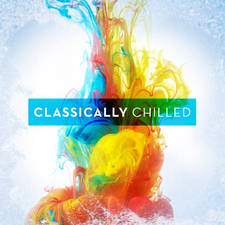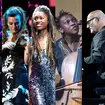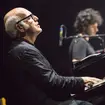Famous composers you didn’t know studied with modernist composer Luciano Berio
28 April 2025, 14:10 | Updated: 28 April 2025, 14:33

These famous contemporary composers studied with the legendary avant garde composer.
Listen to this article
Italian composer Luciano Berio (1925-2003) is most famous for his experimental avant garde music, including serial compositions, pieces with electronic and pre-recorded spoken elements, and aleatoric music, which is also known as chance or indeterminate music because the piece has elements deliberately left to the choice of the performer instead of the composer.
The resulting music is often in service of ideas and experimental techniques, more than it is in the resultant melodies, harmonies and textures they create. More predictable melodies and harmonies give way to chance and complexity. Listen to Berio’s famous 1969 Sinfonia, or the well-known Sequenza (1958-2004) series of highly virtuosic works for solo instruments, to get a taste.
That’s not to say Berio wasn’t also a very lyrical composer. In fact, there’s a whole generation of composers who studied with Berio, who write remarkably lyrical and melodic music. This includes several that have broken out into the mainstream, seemingly approaching music in exactly the opposite way their teacher did.
Here are some of the famous composers you didn’t know were students of Berio.
Read more: 10 best pieces of minimalist classical music for ultimate relaxation
-
Ludovico Einaudi (1955-)
Italian pianist and composer Ludovico Einaudi’s minimalist piano and instrumental works make up some of the most accessible and widely-loved pieces of classical music known today. His music, with its ingenious simplicity and easy-listening melodies, may seem the complete opposite of Berio’s, but it’s Berio who taught Einaudi “that there is a sort of dignity inside music… I learnt orchestration from him and a very open way of thinking about music.”

Ludovico Einaudi - 'Elegy for the Arctic'
-
Max Richter (1966-)
Another man of minimalism and beautiful melodies, Max Richter is famous for his recomposed rendition of Vivaldi’s Four Seasons, as well as the sublime music in Sleep, Voices and works like On The Nature of Daylight and Vladimir’s Blues. His work is achingly beautiful and moving, and much more accessible than Berio’s on the surface. Richter studied composition at Edinburgh University before relocating to Florence to study with Berio. Perhaps it’s like everything: we rebel against the previous way of doing things, and Berio’s avant-garde focus on sound and complex systems in music appears in Einaudi and Richter to have resulted in his students swinging back to look at pure melody and harmonic simplicity.

Max Richter - On The Nature Of Daylight (Entropy) | 2018 Version
-
Steve Reich (1936-)
Steve Reich is one of the most influential composers of our time. Famous pieces like Different Trains, Music for 18 Musicians and Clapping Music, which deploy electronics, minimalism and phasing (which sees incremental variations in timing used to gradually develop melodies into overlapping patterns that shift through the piece) respectively, have changed the way people think about music. Reich studied with Berio and had great affection for the composer, even though his ideas were often at odds with Berio’s avant-garde serialist approach.

Music for 18 Musicians, by Steve Reich
-
Louis Andriessen (1939-2021)
Dutch composer and pianist Louis Andriessen studied with Berio for two years, after a grounding in music studies with his father, composer Hendrik Andriessen, and others at the Royal Conservatory of The Hague. Andriessen went on to become one of the most influential Dutch composers of his generation, famous for works like De Staat, Hoketus and the opera Writing to Vermeer. Andriessen taught at Yale, Princeton and New York State University in Buffalo among other esteemed institutions.
Read more: Meet Nadia Boulanger, the woman behind the 20th century’s greatest composers

Louis Andriessen - The nine symphonies of Beethoven for orchestra and ice cream bell
-
Noah Creshevsky (1945-2020)
Hyperrealist composer Noah Creshevsky emerged from the lines of two of the 20th century’s greatest musical pedagogues: Luciano Berio and Nadia Boulanger. He took his music in an extraordinary direction when, in the 21st century, he started creating ‘hyperreal’ works which used real performances and sounds, manipulated electronically to be just out of reach of human performers.

Jubilate
-
Phil Lesh (1940-2024)
More famous now for being a founding member of huge Palo Alto rock band, Grateful Dead, Phil Lesh was a bass guitarist who learnt several instruments, including the violin and the trumpet, before enrolling in music schools. He studied composition under Berio in the same class at Mills College in Oakland, California, as Steve Reich. His melodic and improvisatory bass playing helped make Grateful Dead distinctive, and helped cement the so-called ‘San Francisco Sound’ in rock music in the ‘60s and ‘70s.

Grateful Dead - Box Of Rain (Philadelphia, PA 7/7/89)
























